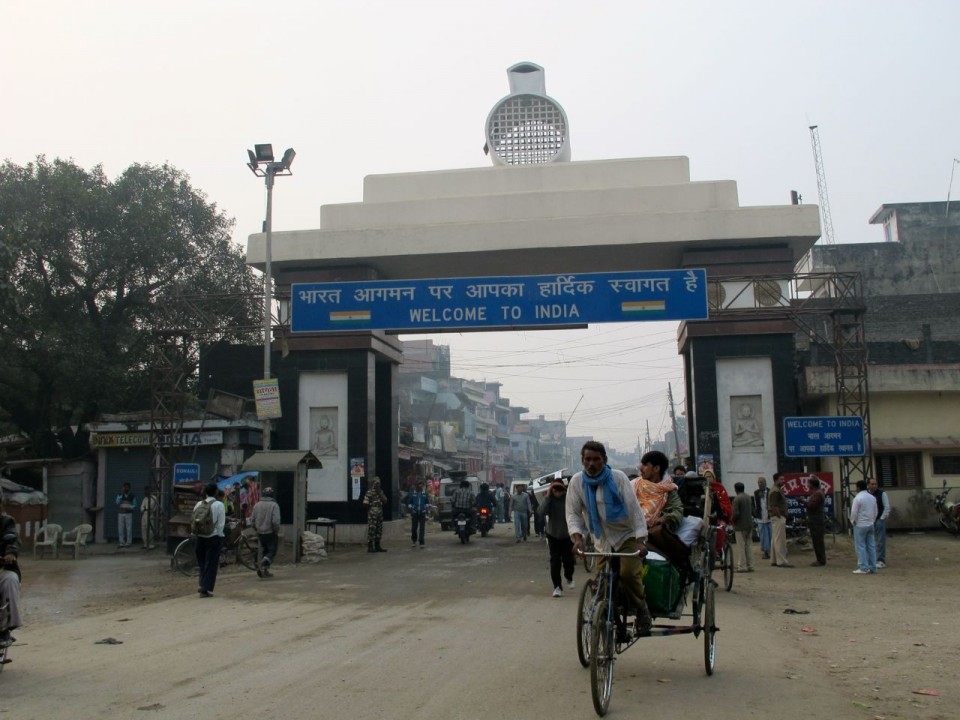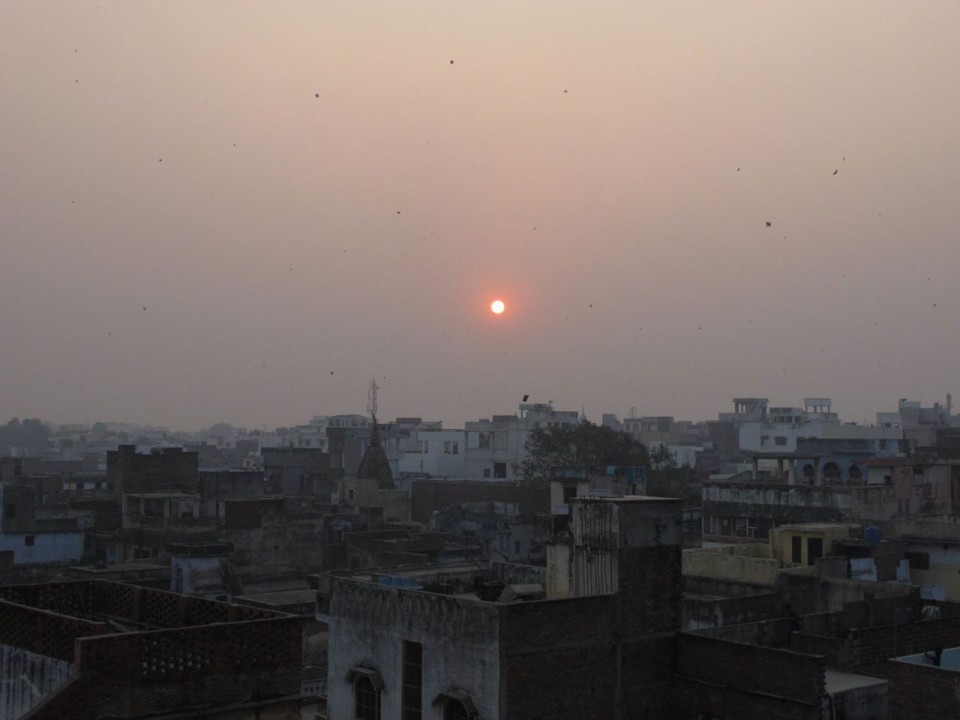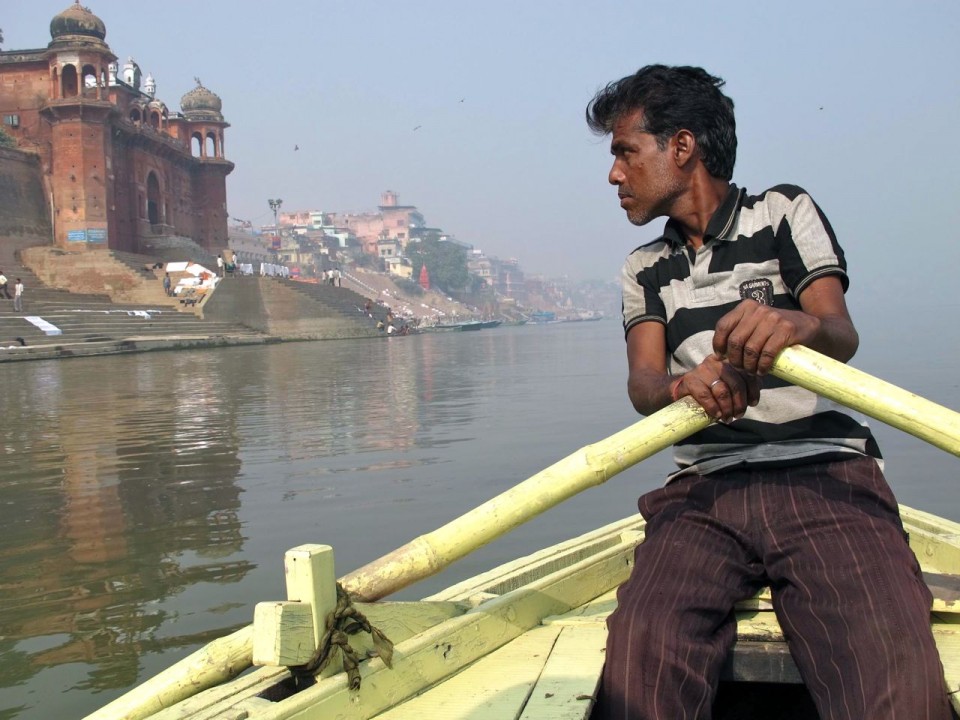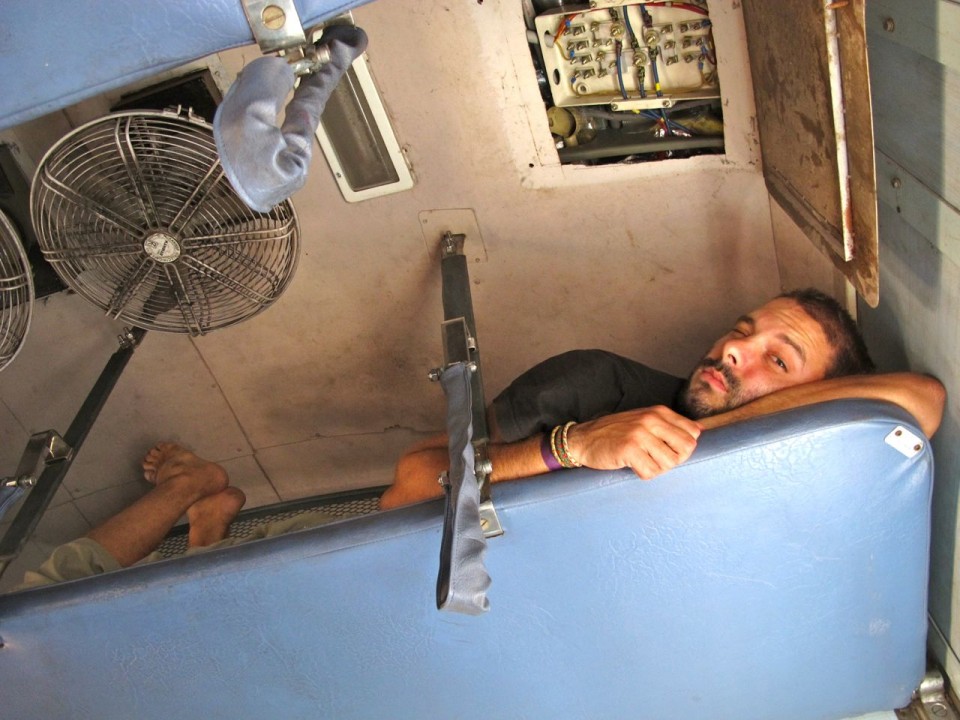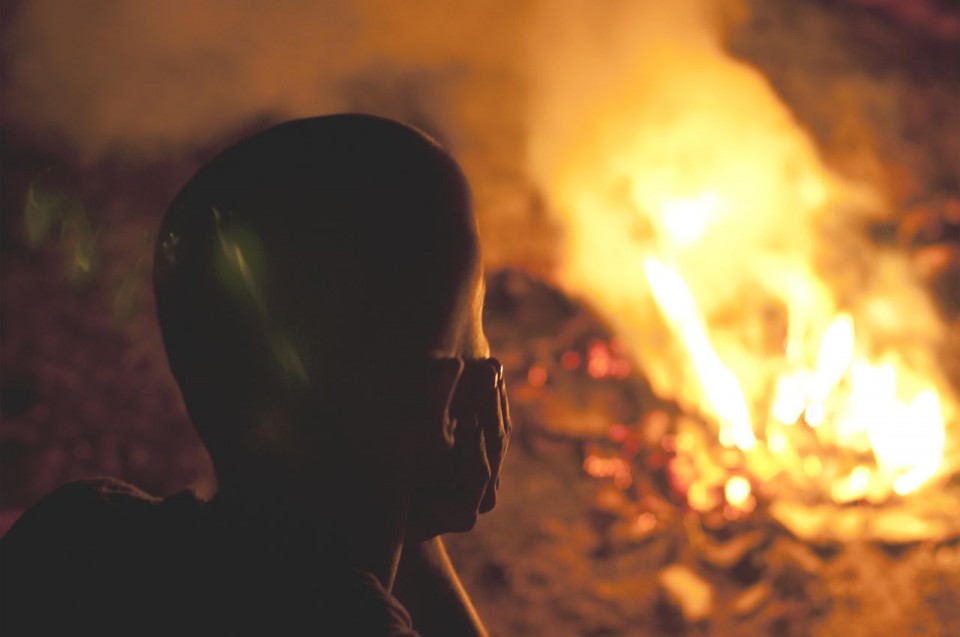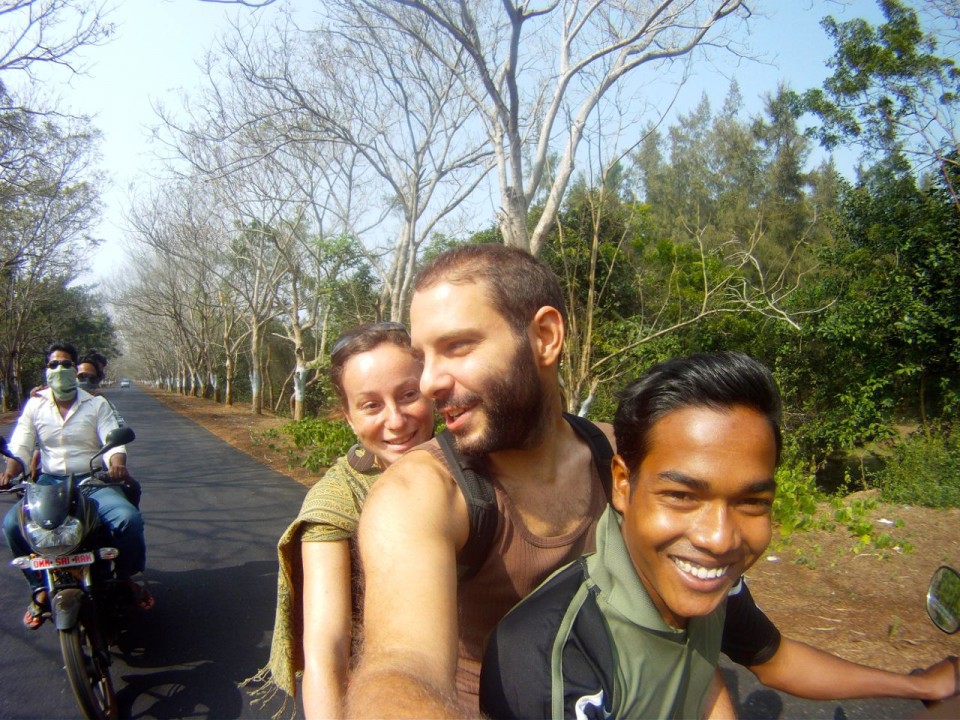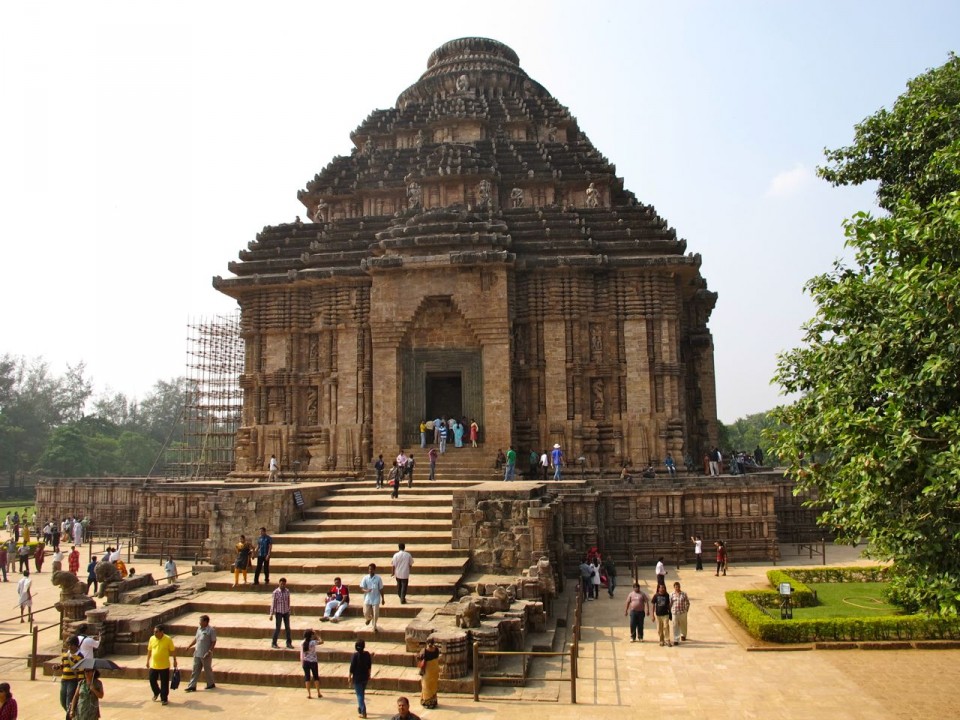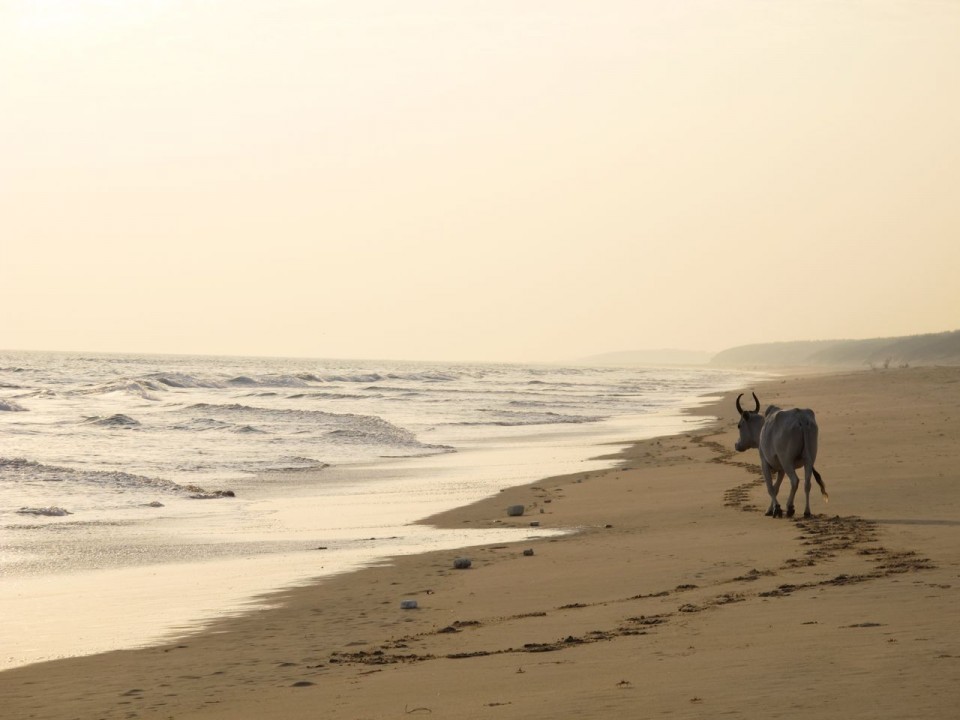Even tough we passed the border, there were no obvious differences between Nepal and India, but it would arise soon. We tried to negotiate a lower price for the taxi and that was, in fact, our only choice since we didn’t have any Nepali rupees left. All I had was some Indian change and there was no sight of an ATM. I showed them my MasterCard, shrugged and, shortly after, the chauffer agreed on 30% off the price that he’d asked for in the first place. After two and a half hours of driving we arrived to Gorakpur only to notice that the traffic was growing thicker, the temperature was getting higher and the number of people and animals by the road was growing bigger. Welcome back to India!
We bought train tickets to Varanasi because I’d promised myself that there would be no more driving in buses in India, unless if there’s no other choice. We sneaked into a sleeping wagon since there was hardly anyone especially during the day so the two of us, unaccustomed to luxury, found two free beds. We fell asleep and woke up just before we came to Varanasi. It felt nice to be back in a known town. Usually, this is so untypical of me, apart from Amsterdam where I’ve been six times, but that’s another story. You know where you’re going, you are familiar with the prices, you know the location of the cheapest hotel in the town. Moreover, you are able to recognize a sham when a tuk-tuk chauffer wants to take you to the other part of the city so he could receive a commission-fee from the owner of the hotel. You can also show off a bit by being a tourist guide to a young (although a bit older than you) French lady who’s in India for the first time.
We stayed in the same hotel where Kev, Gina and I’d stayed two weeks before, we went to the same restaurant so I was pretty sure that there wouldn’t be any consequences that could jeopardize our health, and, finally, we watched the sunset on the same roof on which I spent my nights. Nothing had changed, expect the people we were with, mostly Japanese and Spanish. In Nepal, Caro and I played a little game called spot a white guy!, but in Varanasi there was no point in playing it since they were everywhere, that is we were everywhere. Damn those tourists!
Speaking of tourists, I made a use of my return to Varanasi to go back to the tourist agency where they’d sold me the package tour to Kathmandu, and which was, as you could read in my earlier posts, a total rip-off. So I got inside, with a grave expression on my face, slowly sat on a chair and with a delusion in my voice I told them everything about my journey from Varanasi to Kathmandu. My face was red from the embarrassment, but, being surprised by my return on the crime scene, the man apologized sincerely for all the inconvenience the agency caused and he returned me almost half of the money I’d paid. Victory!
Since two weeks before I’d been busy with my health problems, this time I did some sight-seeing of Varanasi. Nothing changed – ghats were still there, people were bathing in Ganga, bodies of dead people were being burnt near the river and thrown inside, and a never-ending stream of local people was approaching us asking boat, sir? We were successful at saying no to them until our last day there when we met two French ladies who were looking a way to the hotel – the same hotel from which we’d just checked out. A combination of their laziness to carry the backpacks all the way to the hotel and of our amenability to the noisy boat drivers resulted in agreeing on a ten-minute sight-seeing from a totally different perspective.
And it was nice. I think it won’t be difficult to come back to this town for the third time once in the future. Even though, at first sight, all you see is dirtiness, poverty and chaos, the town has a special kind of energy that draws you to it: the colorful ghats, monuments, temples, narrow streets, aromas coming from the fragrant sticks, smiles on the local people’s faces, accessibility of the tourists who don’t point their noses towards sky. Intensity, that’s it. Varanasi – mini India.
After the ride on Ganga, we headed towards east, towards Puri. When I think about it, the reason for going there was, kind of, funny. While hanging with a couple of CouchSurfers in Kathamandu, I came across a map of India on which someone circled Puri, a little town on the east coast. Later I remembered that Keveen mentioned that place, and there was a relatively active CouchSurfer there so we decided to hop on a rickshaw, go to the train station, and start a thousand-kilometers journey to see if there was anything to see in Puri. Caro felt awkward riding in a bicycle-rickshaw because she had the feeling that the driver was our slave. I tried to explain to her that it was a regular job there and that there was nothing embarrassing about it, adding that it wasn’t so difficult – at least I didn’t find it difficult the year before in Bangladesh. Since she didn’t pay much attention to my arguments, I decided to change my approach so I raised my right arm and lowered it very quickly while producing a sound similar to the sound of a whip – everything to make her idea of a slave-driver more realistic. She started laughing and stopped complaining – my change of approach was successful.
We were sitting on the station waiting for our train which was usually a couple of hours late so we decided to play and sing something for the people who were waiting with us. They gathered around us, observed us closely, but there were no smiles, no applauses, not one with 100 euros or so. As you can see, they were curious, but rather passive.
Once in the train, we had to bribe the conductor because we didn’t booked a berth, and with constant looks of curious people, we slept most of the way to Puri.
We didn’t receive an answer to our CS request, but we found a mobile number on Sanjay’s profile so we sent him a message the moment we arrived in Puri. The answer was simple – we surf and camp, join us if you want to. We got ourselves two bus tickets for only 10 cents and arrived in Rangers, where the center of Sanjay’s surf club is situated. Right on the entrance we noticed a big poster of Bob Marley that said – ONE LOVE. I instantly felt that this place was my cup of tea. We ordered ourselves a cup of tea while we waited for the guys to return from the beach. Sanjay came back first, but was soon followed by the rest of the group: an American, an Italian, a Hungarian, a Swede, a Spanish and a few Indians – they were all volunteers helping with a project, the first surf festival in India. And they were all quite happy.
Caro and I set up my tent for the first time after two months of carrying a two-kilo load around in a backpack. It was slowly getting dark and everyone gathered around the camp-fire. After that we went down to the restaurant which was a part of the surf center and we ordered the only meal that wasn’t too spicy – chilli mushroom. Oxymoron, right? While we were at the restaurant, an Indian girl from Goa named Swaati joined us and started talking about the project. I started falling in love. Falling in love with the project; with the place; with the people – despite the fact that we’d been there for only a couple of hours. However, knowing myself: I get turned on easily, but even more easily turned off. This was the reason why I decided to put it all down on paper. Soon there were ten things I loved about this place:
- peace and quiet, there was no noise, no sound of the car horns, there wasn’t too much people
- the beach was supposed to be heaven-like (check tomorrow!)
- homemade, delicious and inexpensive food
- access to the Internet (a man has to work, too)
- the weather was always nice – warm and sunny
- Swaati complimented my guitar skills (this doesn’t happens that often so it had to be part of the list)
- a potential new hobby – surfing
- surf festivals were being organized – a small group of people, acoustic music (my favourite!)
- when there was no moon, stars were supposed to be wow
- the guys were great
It was quite a promising list after only a couple of hours spent there.
The following day, after the breakfast at the restaurant, I was walking on a road that led to our tent, which was 200 meteres distant from the restaurant, when suddenly a car pulled over. With a lot of gestures and smiles I realized that the driver was offering me a ride, if I needed one, of course. I responded in the same way, thanking him and declining the offer. Moreover, I was surprised that someone can understand the concept of hitchhiking, even without your asking him or lifting the thumb. Was I finally home?
Since most of the group was busy with planning the festival and taping a couple of surfers who found themselves there, Caro and I decided to go for a walk to Konark which was twenty kilometers away from Puri. We stood by the road waiting for, either a cheap bus which passed every half an hour or a good Samatarian who would give us a lift. We spent the first ten minutes in the shadow of the trees while only bicyclists were passing by smiling at us (another positive thing to add to the list) and, also, tuk-tuks that were too expensive. There were also a couple of motorbikes with two/three people on them. And then, a historical moment in my hitchhiking career – four guys on two motorbikes pulled over. They asked us if everything was all right and we seductively answered that we were headed to Konark. They instantly switched places so there were three guys on one motorbike, and only one on the other. Caro and I hopped on the other motorbike. It was my first motor hitchhiking in my career! And, of course, it was another plus on the list.
Despite the wind we tried to comunicate with the driver and managed to exchange a few sentences. Even though we didn’t understand half of what was said, we hit on pretty well. We noticed another rare thing – the road didn’t have any bumps and there was no much traffic going on, no wild or domestic animals. In fact, it was a real pleasure ride on it, which is extremely rare in India. Another plus.
We arrived to Konark, said goodbye to our drivers after we’d taken a few photos with them and went to the Sun Temple, a 750-year-old temple which was basically the biggest tourist attraction there. If you wanted to get in, you needed to pay 250 rupees, while the local people had to pay only 10 rupees. So typical of India. However, we knew that the temple was one of India’s seven wonders, a part of the cultural heritadge, and it also had diferent kind of erotic images so, we gave in and bought two tickets. We were ready for some education. Cultural education.
The Sun Temple didn’t leave us delusioned. As the name suggests, it is dedicated to the God of Sun. It’s made of stone and it has all sorts of images from everday life carved in its walls. What attracts most the attention of a cultural ignorant as me are, of course, the erotic images of men and women, couples, ménage à trios, etc. Too bad the locals kept interrupting us every five minutes wanting to take a photo with us…it really isn’t easy to be a celebrity. After some time spent in India and similar countries where our mere presence is a reason for a lot of curiosity and astonishment you tend to be more compassionate to all those famous people from your own country. It’s a difficult life. We paid a lot of attention to each detail of the temple, remebered a few things that would, hopefully, be useful in the future and decided to take a rest on a green lawn, under a tree. You need to find a place to hide from +35°C.
On our way back to Rangers we ran into the crew who was having a meeting in an office improvised by Sanjay: it was in a shadow of a big tree and consisted of a hammock and a couple of chairs. It was an office made of dreams – in nature and without any sounds except for those coming from birds. I also attended the meeting offering my help with Internet promotion of the festival and listening to the stories and absorbing the passion which you could feel every time they talked about surfing. I definitely had to try it out.
In the evening, once more next to a camp fire, I attended an apropriate phenomenom that I hadn’t had the chance to see before – a total eclipse of the moon. Somewbody was playing the guitar and humming, Sanjay brought the leftovers from the restaurant and we agreed that, the following morning, we would go to the shore to watch the sunrise – after all, we were on the eastern coast of India. Before I went to sleep I set the alarm on my cellphone, and in that precise moment I realized that life really is beautiful. Since I’d started the journey I’d only used the alarm 3 or 4 times. Instead, I would wake up when I wanted to, and go to sleep when I felt the need to do so. I think I found the definition of a comfortable life – it’s the one in which you don’t have to set the alarm clock every morning. The sunrise was due at 6.12, so I set the alarm at 5.32.
The morning was foggy, humid, but it was still relatively warm. I woke up Caro and Swaati and still feeling quite sleepy we headed off to the beach. It took us nearly half an hour to get there since we had to pass through a thick forest. We arrived to the beach at exactly 6.12, but it was still quite foggy so we couldn’t see anything around us, let alone the sun which was very far away. We sat on the soft sand and tried to summon the sun and tell the fog to go away. We noticed a few huge turtles on the beach, a couple of stranded jellyfish, and as the sky was starting to clear out I noticed that it was impossible to see the end of the beach, no matter which direction you watched. Moreover, there was no sign of a company, if you exclude a couple of strayed cows and crabs. We were alone with the waves.
The moment the sun appeared Swaati and I got into the sea. I realized that it was the first time I was in the sea since my stay in the south of Turkey, on the heaven-like beach in Kabak. Although I am on my thousand-days-of-summer tour, going to the beach was quite a luxury. Swaati was showing me how to body surf on huge ways; they were huge, at least compared to those in Croatia, and I tried to explain to her the basics of the Croatian national sport – picigin. In the evening we returned to the beach with the rest of the group and were taken aback by the scene: there were a couple of dolphins playing in the moonlight, jumping a few meteres in the air – it seemed that they were performing the whole show just for us. A couple of us, without any tourist, just sat on the beach, without our cameras and enjoyed the incredibly beautiful game of nature.
I stayed in Rangers for the following ten days. It felt like home, I had my own tent, enough peace and quiet, and there wasn’t anything that could distract me so much that would make me leave that place. The more time I spent travelling, the less I wanted to move. I tried to work on the quality of my journeys instead of focusing on the quantity. I began spending more time with people, exchanging stories, feeding on their laughter and their positive energy. It was definitely one of the most beautiful things on my journey.
Caro and I were back to hitchhiking, but this time towards the other way – back to Puri. Puri is one of the four Indian holy centres of the Hindu pilgrims: all because of the Jagannath temple which every Hindu has to visit at least once during his or her lifetime. Unfortunately, a non-Hindu cannot enter the temple so you’ll have to do without the description of such a holy and important place given the fact I usually have the habit to give you similar descriptions. Um, yeah.
Several days before Christmas I got on a train and went to Delhi where I was supposed to meet Tanja with whom I would be spending the following three weeks travelling to the very south of India. Then she would go back to Europe and I would proceed towards east. I thought about the fact that, even though I started off this journey on my own, since I’d left Europe I was always accompanied by someone. Sara from Portugal was with me from Istanbul to Denizli, Tanja surprised me on the south of Turkey and from there we started our two-week hitchhiking adventure across Turkey, Iraq and Iran. I was alone during my visit to the rest of Iran and Pakistan. I spent my first three weeks in India with Kev and Gina, and, finally, I was with Caro while visiting Nepal and the last part of India. So much of my being a solo adventure guy. However, there is a lesson here – you’ll always be able to find someone to share a piece of road with, if you want to. There are a lot of travellers out there in the world and it’s only a matter of time when you’ll bump into someone with whom you can/want to travel.
During the fourty-hour ride from Puri to Delhi I managed to read half of the thickest book I’d ever seen – Shantaram. A lot of people travelling through India had read it and were thrilled with it so I had to read it, too. As I proceeded with my reading I was starting to like the book more and more even though, as my taste for books is concerned, it was a bit too detailed. The protagonist seemed to had remebered more details than me, since he was living and passing through the same area as me. I wondered – was I a good traveler, whatever that meant. Was I absorbing the local culture, learning the langauage? Was I interested in the local customs, the local food, the religion of the locals? Considering my knowledge about the countries I’d been to the right answer would be – no. I’ve always had the same excuse – I travel because I want to meet new people, and not because of the places, customs and so on. However, it was becoming more and more difficult to find people. While I was hosting people from CS in Zagreb it was pretty easy to find those people who would teach me something about life, travelling, luck – those were the things I didn’t know much about and I didn’t have much experience with. Now, after a couple of years of experience in travelling I can say that I’ve learnt a lot from the people I met in my home or while I was on the road. Not only that but even I was useful for some because they learnt something from me.
Still, I was only a kid who doesn’t have a clue what he wanted to do in his life. A kid who was still in a search. In a search for something. In a search for someone. Someone who would teach me. Someone who knew better than me.
